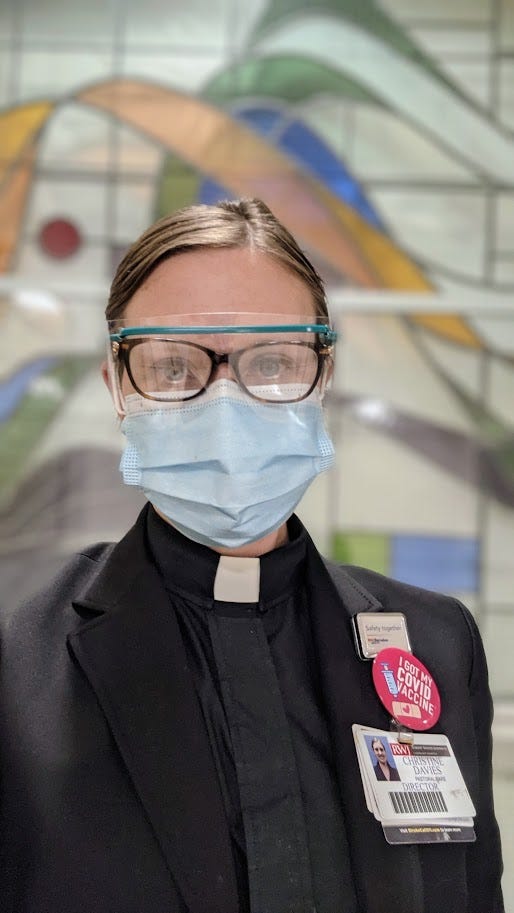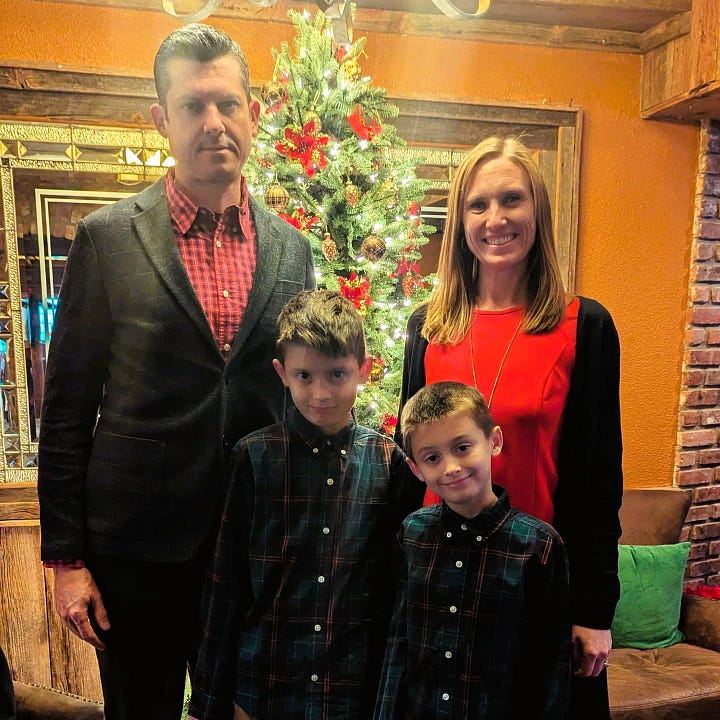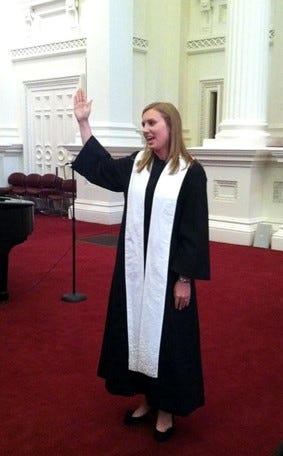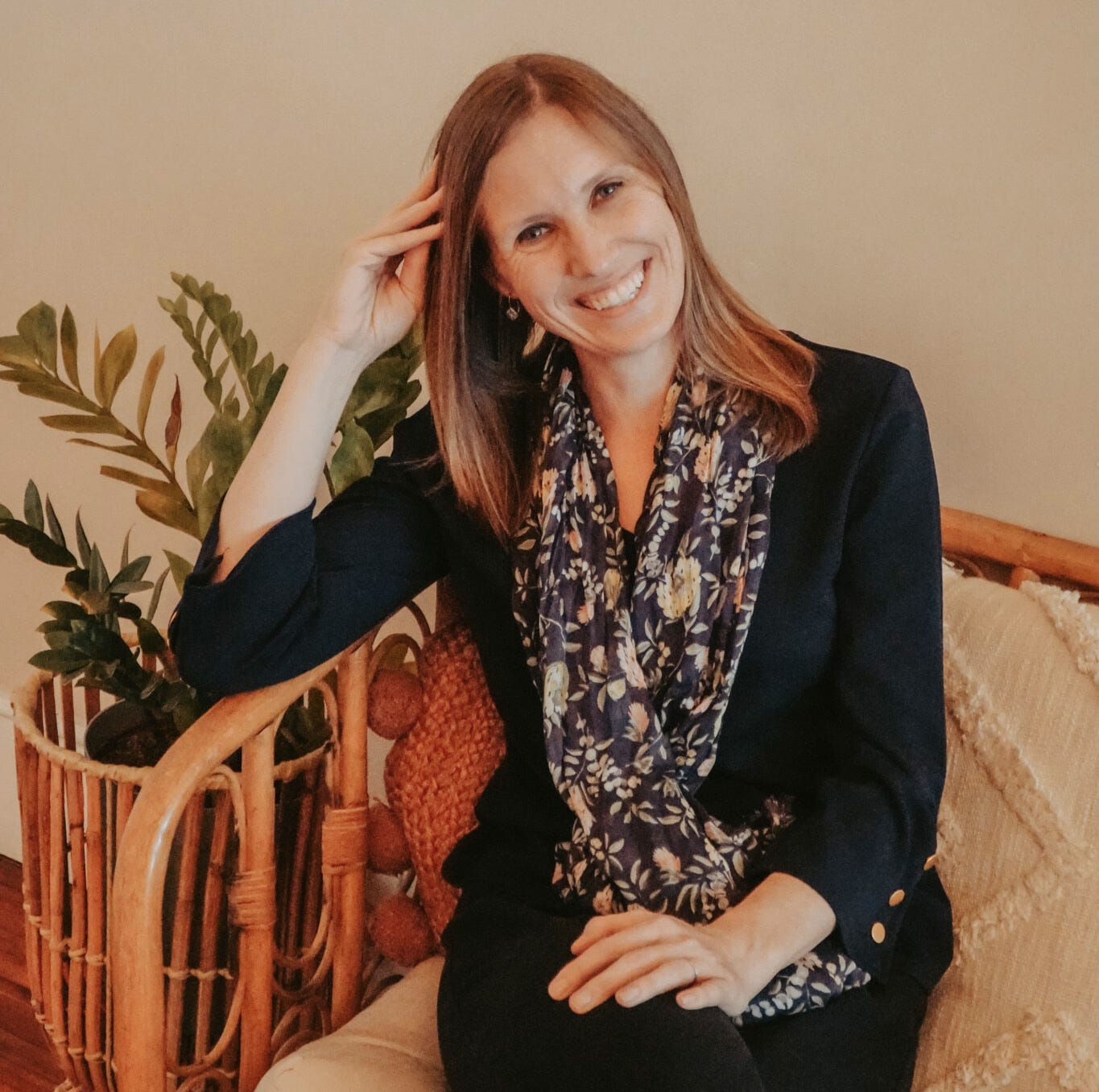The Power of Story When We Move from This Life to the Next
From a hospital chaplain who specializes in end-of-life care
I first “bumped into” Christine on Substack (the platform that hosts my blog). When I discovered her ministry as a hospital chaplain, I was moved beyond words. Here is someone who not only witnesses suffering every single day, but gently walks patients and their families through some of life’s most devastating and terrifying trials. As someone who has spent more time in hospitals than I ever could have imagined, I fully understand the grief and confusion faced by those who find themselves in such situations.
Hardship is universal, part of our human condition, yet, we all want to distance ourselves as far away from it as possible even if the victim is someone other than ourselves. Our aversion to pain is so instinctive, so deeply buried within us, that we shun affliction because of our fear of the pain itself. Intimately witnessing the suffering of others makes all of us extremely uncomfortable.
Have you ever observed firsthand someone in extreme pain? Someone enduring an agonizing death due to a malicious disease? Someone who is so wracked with grief they are not even conscious of their own existence; they just moan and wail in anguish? We can hardly stand to remain in the hospital room, by their bedside, or even on the phone. Their hardship is unnerving. For this simple reason, we distance ourselves from the distress. We put space between ourselves and the afflicted so that which we fear the most will not come upon us; as if their misery is contagious.
Despite our natural inclination to avoid such “unpleasantries,” Christine has courageously chosen a different path. Every day, she chooses to intimately immerse herself in the hurt and hardship of others. For her, witnessing suffering has become second nature. Through her ministry she not only offers personal presence and companionship to the lonely and hurting, she brings with her THE presence of the one and only True Comforter. What a beautiful example of the gospel on display.
“For I was hungry and you gave me something to eat, I was thirsty and you gave me something to drink, I was a stranger and you invited me in, I needed clothes and you clothed me, I was sick and you looked after me, I was in prison and you came to visit me…. Truly I tell you, whatever you did for one of the least of these brothers and sisters of mine, you did for me.”
(Matt. 25:35-40).
THE POWER OF STORY WHEN WE MOVE FROM THIS LIFE TO THE NEXT - CHRISTINE DAVIES
I was a chaplain intern during the time when hospitals maintained different floors for patients with HIV/AIDS. I was assigned to that unit and was surprised that the patients there were so happy to see a chaplain. The patients were incredibly lonely as many people would not visit due to fear, stigma, and misinformation about the contagiousness of their illness.
One of the first patients I ever saw, Shirley, was on that unit. She was admitted a few days after I began my 10-week summer internship and died the week before I left.
When I first introduced myself to Shirley, she threw her arms up in the air and demanded “Yes, sit down, I have so much to talk with you about!”
Indeed, she did, and we spent many afternoons that summer engaging in what I would later learn is called “Life Review”—an intentional conversation reflecting on the highs and lows of one’s life, all the major events that had occurred, all the sorrows, regrets, and celebrations. Shirley insisted on calling me “my Pastor,” although it came out as “my Pasta” in her thick New York accent. I told her that I wasn’t allowed to be called that, as I was still in seminary and not yet ordained. She didn’t care. She was a lifelong member of her church, but her own “Pasta” never visited. She told me she was “hatched, matched, and ready to be dispatched” in the same church. I had no idea what she was talking about and she spelled it out for me: “hatched - I was baptized there as a baby; matched - I was married to my husband; and dispatched - what they are going to do at my funeral when I die.”
I tentatively asked Shirley about how she felt about that last part of the rhyme. “I’m ready, Pasta. I’ve been in pain for so long. It’s been lonely without my husband (who died of heart failure years earlier). I’m eager to see him again. My kids are all grown and they will be fine without me. They’re sad, so I can’t tell them that I’m not afraid because they tell me to keep fighting.”
Shirley was the first patient I ever spoke to about her impending death and she taught me what it meant to have peace with it. It was only later that I realized how rare acceptance that is for most people. She faced the end of her life with calmness and clarity. In the stories she shared with me over the next two months, we laughed and cried together about all she had been through.
Her faith didn’t falter, although when I asked, she acknowledged some anger toward God. She told me that she was looking forward to meeting God and she had several questions for “the big guy” mostly relating to theodicy or as she put it “Why do kids get cancer, that’s just not fair.” I thought of the Corinthians verse about presently looking through a mirror dimly but being promised one day to see God in full. Shirley was counting on that day and planned to give God a piece of her mind. I took comfort in knowing she would get some answers, even if the rest of us would still be in the dark.
I wasn’t at the hospital the night she died. Her son called me the next day, “My mom told me I had to tell you, her pastor, thank you for three things: your company, your understanding, and helping her get ready to be dispatched. I don’t know what that last one means, but she made me underline it and said you’d know.”
A few years later, after lots of coursework, internships, and various exams, I was ordained as a Minister of Word and Sacrament in the Presbyterian Church (USA). The title Reverend was bestowed upon me and was officially a pastor. I was granted the authority to do all the rituals related to “hatching, matching, and dispatching.” My family and friends were all there and lovely things were said and we had cake and a party afterward.
While the ordination service was meaningful and the culmination of a lot of work, for me it was superfluous. Shirley had already ordained me her “pasta” years prior. In providing spiritual care at the end of her life, she helped me to see the value of the work of chaplaincy and the difference I could make when I took time to listen. She also helped me recognize that tomorrow is not promised and life is preciously short. She taught me to make the most of the time we have in this world by living with the reality that death comes for us all, often before we are ready. In many ways, she became my pasta. More than 20 years later, I remain grateful to her for trusting me with her story.




What kind of impact have you witnessed when you sat with others and were simply present? How have you felt when others truly listened to you in a time of need?
Let’s Share Stories! I hope you will continue to join me as we celebrate the power of story together. Click on the links below to subscribe or share.
The Rev. Christine Vaughan Davies runs the hospital chaplaincy program at Robert Wood Johnson University Hospital, where she teaches chaplain interns how to listen to patients’ stories. She is also a trained Spiritual Director and meets with individuals to listen and discern to what God is doing in their lives. She lives on a small farm in New Jersey with her family and you can read her writing at https://journeyingalongside.substack.com and/or have a Spiritual Direction session with her via https://www.christinevdavies.com







Thank you for sharing this lovely interview with Christine, Megan!
Christine - I love that your 'The Pasta', and 'hatched, matched and dispatched!' there is so much community in those three words.
It's lovely to learn more about your journey and your chaplaincy beyond your publication. Thanks to both of you.
God bless you for your service. What a beautiful story and lesson.